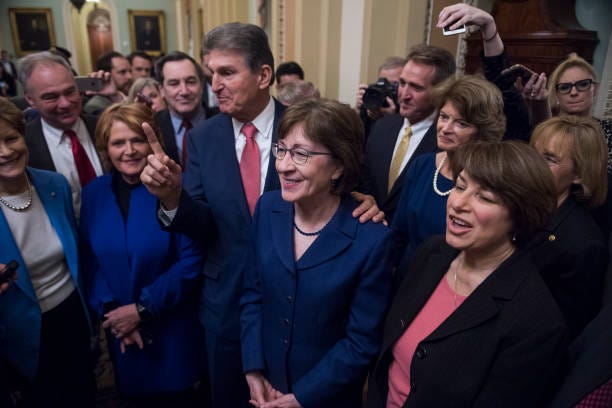
In a startling turnabout, Senate Majority Leader Chuck Schumer and Sen. Joe Manchin announced an expansive agreement Wednesday that had eluded them for months addressing health care and climate, raising taxes on high earners and large corporations and reducing federal debt.
The two Democrats said the Senate would vote on the wide-ranging measure next week, setting up President Joe Biden and Democrats for an unexpected victory in the runup to November elections in which their congressional control is in peril. A House vote would follow, perhaps later in August, with unanimous Republican opposition in both chambers seemingly certain.
Just hours earlier, Schumer, D-N.Y., and Manchin, D-W.Va., seemed at loggerheads and headed toward a far narrower package limited — at Manchin's insistence — to curbing pharmaceutical prices and extending federal health care subsidies. Earlier Wednesday, numerous Democrats said they were all but resigned to the more modest legislation.
Speaking with WCCO’s Vineeta Sawkar, Senator Amy Klobuchar, D-MN, called this a “big deal”.
“You know me, I like to get things done and not everyone can get everything they want,” Klobuchar told WCCO. “But this is a big deal because number one, we're finally doing something about Medicare drug negotiations.
I've been leading that bill forever. Because right now Medicare, which represents millions and millions of seniors, they literally can't negotiate prices. They're locked into high prices with pharma. And what that means is we pay more for drugs. All of us do. Even people that aren't in Medicare.”
The agreement contains $288 billion the government would save from curbing pharmaceutical prices. Those provisions would also require Medicare to begin negotiating prices on a modest number of drugs, pay rebates to Medicare if their price increases exceed inflation and limit that program's beneficiaries to $2,000 annual out-of-pocket expenses.
Klobuchar adds that the climate investment is significant and long overdue.
“Finally doing more to invest in clean energy and do something about greenhouse gasses that would get them down to uh 40% less by 2030,” Senator Klobuchar explained. “That's a really big deal.”
While the 40% reduction would miss Biden's 50% goal, that reduction, the measure's climate spending and the jobs it would create are “a big deal," said Sen. Jeff Merkley, D-Ore., an environmental advocate who had been upset with the absence of those provisions until now.
The reversal was stunning, and there was no immediate explanation for Manchin's abrupt willingness to back a bolder, broader measure.
Since last year, he has used his pivotal vote in the 50-50 Senate to force Biden and Democrats to abandon far more ambitious, expensive versions. He dragged them through months of negotiations in which leaders' concessions to shrink the legislation proved fruitless, antagonizing the White House and most congressional Democrats.
“This is the action the American people have been waiting for. This addresses the problems of today — high health care costs and overall inflation — as well as investments in our energy security for the future," Biden said in a statement. He urged lawmakers to approve the legislation quickly.
“Rather than risking more inflation with trillions in new spending, this bill will cut the inflation taxes Americans are paying, lower the cost of health insurance and prescription drugs, and ensure our country invests in the energy security and climate change solutions we need to remain a global superpower through innovation rather than elimination,” Manchin said.
Schumer called the bill Congress' “greatest pro-climate legislation.” He said it would also cut pharmaceutical prices and “ensure the wealthiest corporations and individuals pay their fair share in taxes.”
The overall proposal is far less aspirational than the $3.5 trillion package Biden asked Democrats to push through Congress last year, and the pared-down, roughly $2 trillion version the House approved last November after Manchin insisted on shrinking it. Even then, Manchin shot down that smaller measure the following month, asserting it would fuel inflation and was loaded with budget gimmicks.
In summaries that provided scant detail, Democrats said their proposal would raise $739 billion over the decade in new revenue, including $313 billion from a 15% corporate minimum tax. They said that would affect around 200 of the country's largest corporations, with profits exceeding $1 billion that currently pay under the current 21% corporate rate.
The deal also claims to gain $124 billion from beefing up IRS tax enforcement, and $14 billion from taxing some “carried interest” profits earned by partners in entities like private equity or hedge funds.
The measure would spend $369 billion on energy and climate change initiatives. These include consumer tax credits and rebates for buying clean-energy vehicles and encouraging home energy efficiency; tax credits for solar panel manufacturers; $30 billion in grants and loans for utilities and states to gradually convert to clean energy; and $27 billion to reduce emissions, especially in lower-income areas.
It would also aim $64 billion at extending federal subsidies for three more years for some people buying private health insurance. Those subsidies, which lower people's premiums, would otherwise expire at year's end.
That would leave $306 billion for debt reduction, an effort Manchin has demanded. While a substantial sum, that's a small fraction of the trillions in cumulative deficits the government is projected to amass over the coming decade.
AP reporters Matthew Daly, Will Weissert, Kevin Freking and Seung Min Kim contributed to this report.



